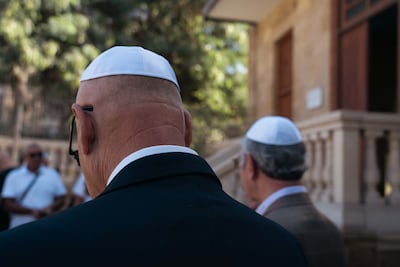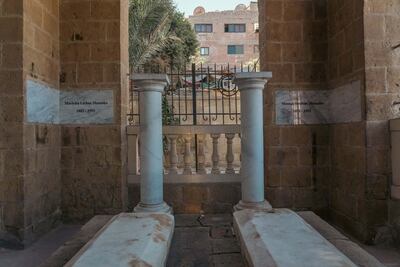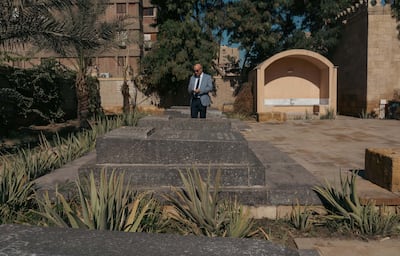One of Cairo's few remaining Jewish cemeteries and the world's second oldest reopened on Sunday after a three-year renovation funded by US-based institutions.
A ribbon-cutting ceremony took place on Sunday morning at two adjoining family graveyards in the working class district of Basatin in the Egyptian capital after the completion of a conservation project lauded by many of the ceremony’s attendees, the majority of whom were Jews of the Karaite tradition.
Karaism is a religious movement in Judaism that only upholds the values of the Torah and rejects oral traditions like the Talmud and other Rabbinic texts.
A sense of joy hung over the ceremony on Sunday, particularly among the Jewish attendees, one of whom, while speaking happily in Hebrew, handed out kippahs, the brimless cap traditionally worn by Jewish males, to the other male guests.

A highlight of the reopening was when David Ovadia, president of the Karaite Jews of America, which provided the majority of the funds for the restoration, was joined by Elie Tahan, an Israeli citizen and president of the International Karaite Community, to perform a rendition of the Mourner’s Kaddish, a hymn sung in Aramaic by Jewish mourners commemorating the death of a loved one.
Mr Ovadia said he was overjoyed to return to Egypt for the first time since 1962. His wife, Mary Ellen, who recited the Rabbinic version of the Mourner’s Kaddish after her husband, underscored Egypt’s prominence among Jewish people as the place where millions of them lived and died over the centuries.
Yacoub Youssef Cohen, a Jewish man who was born in Egypt in the late 1930s, told The National that this was a meaningful moment for him. “I am glad to have lived to see it,” he said.
Mr Cohen’s wife and his children were delivered by Dr Musa Menasha, who occupies the largest of the graves at the cemetery. Mr Cohen said he had been saddened by the news that the doctor’s tomb had fallen into disrepair.
“This is a cause for celebration for all of Egypt, firstly because we are a multicultural country where pharaohs, Romans, Greeks, Muslims, Copts and Jews have lived and second because the people buried here deserve to be remembered. They were real Egyptians who contributed to its renaissance,” Magda Haroun, the head of the Jewish community in Egypt and an outspoken anti-Zionist, told The National.
Ms Haroun recounted being accosted by “knife-wielding thugs” when she first visited the cemetery in 2013, an incident that prompted her to begin trying to restore it.
“They did not allow me to enter and I remember leaving thinking it was a nightmare, how run down the cemetery had gotten. Which is why this is such an important day for me because it is the fruit of the hard work we have done since 2014 to conserve this site,” she said.
The restoration, which cost $150,000, was carried out by the American Research Centre in Egypt and the Drop of Milk Association, a local organisation, led by Ms Haroun, that aims to preserve Egypt’s Jewish heritage.
Funds for the restoration were acquired through the KJA and the United States Ambassadors' Fund for Cultural Preservation.
Established in 1482 under the rule of Sultan Qaitbay, the Basatin Jewish Cemetery, at its height, spanned an area of 147 hectares, said US Ambassador to Egypt Daniel Rubenstein, who was among the attendees.

It is the second-oldest cemetery in the world, predating its official opening under Qaitbay by several centuries, having served as an unofficial cemetery for Jews since the 7th century AD, according to Ms Haroun.
Today, only a fraction of its original area remains, following decades of urbanisation that claimed much of the area’s burial grounds.
Ms Haroun said she would not relent in her efforts to save more Jewish cemeteries in Egypt.
“Egypt is mentioned in the Torah more times than Jerusalem is. Its Jewish traditions must be preserved,” she said.
Before the restoration began, the cemetery, where several members of prominent Egyptian Jewish families the Lichaas and Menashas are buried, had been used to dump rubbish and store tyres.
However, on Sunday it was clean, the stones of its graves polished and its gardens newly planted with olive trees, a symbol of prosperity in Judaism that has become somewhat contentious over the past 100 years because of a law in Israel that allows settlers to claim land by planting trees on it. Olive trees are often used because they grow well in hill country.
The ceremony, which was heavily secured by interior ministry officials stationed at the entrance to the cemetery, was also observed by residents of Basatin, several of whom leaned inquisitively out of balconies in the apartment buildings surrounding the cemetery.
A little further down the road, four reinforcement security vans carrying armed personnel were parked.
Once home to tens of thousands of Jewish people, Egypt under a new republican government in the 1950s began to expel them amid escalating tensions with the newly formed state of Israel. Since then, the number of Jews living in Egypt has dwindled to only three, according to the 2022 census.


